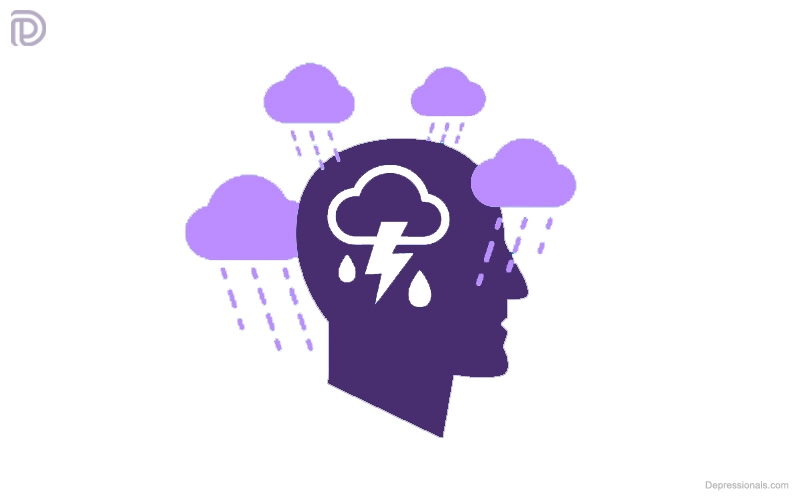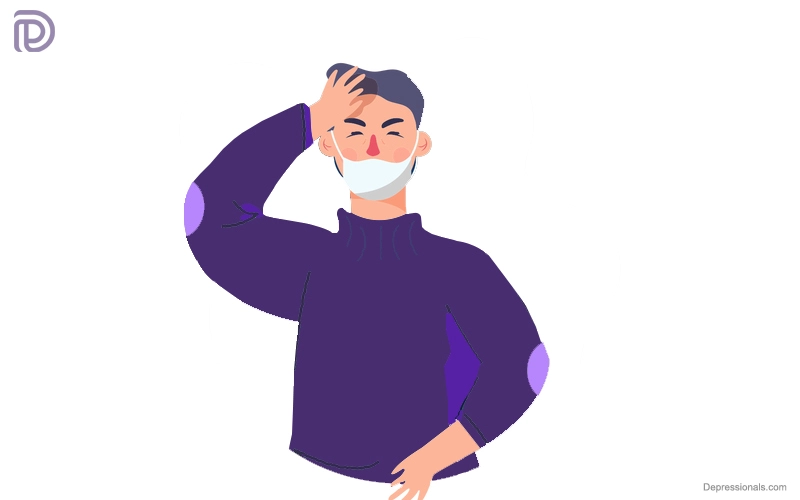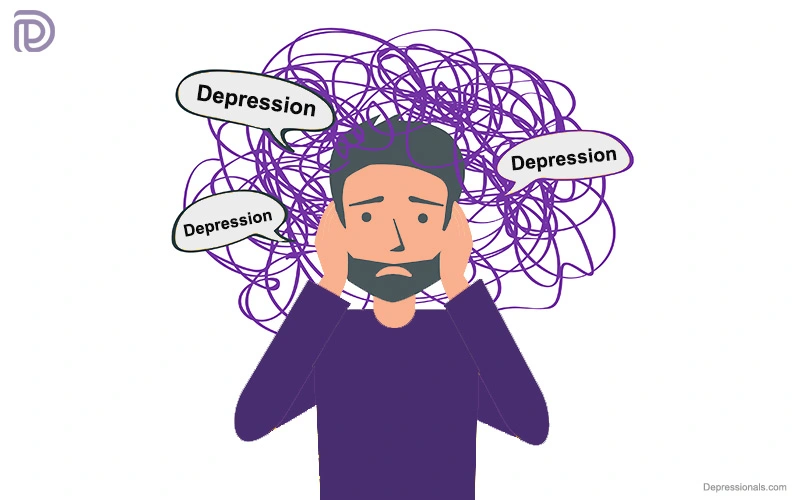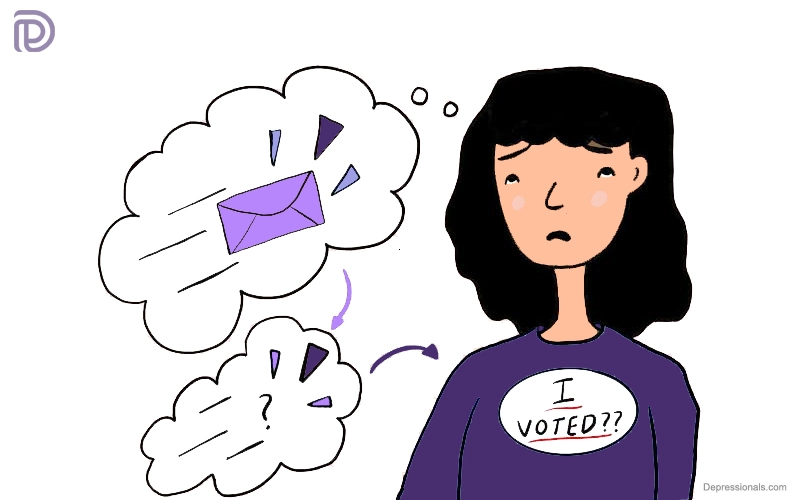What is psychotic depression?
Psychotic depression also called major depressive disorder with psychotic features, is an extremely serious condition that needs to be treated immediately, under the supervision of a medical or mental health professional.
Major depression is a common mental illness that can negatively impact many aspects of a person’s life. Mood, behavior, and various bodily functions are affected, including appetite and sleep.
The person suffering from major depression often loses interest in the activities they enjoyed previously and has difficulty performing everyday tasks. Sometimes it may even seem as if life is not worth living.
Approximately 20 percent of people suffering from major depression also experience symptoms of psychosis. Psychotic depression is a term sometimes used to describe this combination.
A major depressive disorder with psychotic traits is referred to as a major depressive disorder in psychiatry. A person who has this condition sees, hears, or believes things that are not real.
A major depressive disorder accompanied by psychotic features can be classified into two different types. Delusions and hallucinations are present in both instances, but the afflicted person may be dealing with major depressive disorder, either with mood-congruent or mood-incongruent features of psychosis.
Psychotic features associated with major depression are delusions and hallucinations consistent with typical depressive themes. A person can feel insufficient, guilty or worthless due to these feelings.
Psychotic features of a major depressive illness that do not have typical depressive themes result in hallucinations and delusions. Hallucinations and delusions can also be accompanied by mood-incongruent themes.
Delusions and hallucinations in either type can cause considerable fear and can enhance the risk of suicide. Getting the right diagnosis and treatment as soon as possible can prevent anyone from harming themselves or others.
Related: Atypical Depression
What are the symptoms of psychotic depression?
When people have psychotic depression, they experience symptoms of major depression with psychosis.
Signs of psychotic depression are:
- Fatigue
- Irritability
- Difficulty concentrating
- Hopelessness or feelings of helplessness
- Low self-esteem or feelings of shame
- Social isolation
- Loss of interest in once pleasurable activities
- Getting too much or too little sleep
- Changes in appetite
- Weight loss or gain suddenly
- Suicidal threats or talks
When someone suffers from depressive psychosis, they lose contact with reality. People who suffer from psychosis typically experience delusions, false beliefs and perceptions, as well as hallucinations, where they see and hear things that aren’t there.
The belief that you have cancer when you don’t are in some ways false belief. Another hears “you don’t deserve to live” or “you don’t deserve to live.” Some may hear voices blaming them for their conditions.
The person experiencing these hallucinations and delusions believes they are real. They can often make someone panic and end up hurting themselves or others. As a result, you should seek help as soon as possible if you suffer from psychotic depression.
Read: Biology of Depression
Suicide prevention
Whenever you believe someone is in immediate danger of harming themselves or others, call 911.
- If an emergency occurs, dial 911 or the local emergency number.
- Keep an eye on the person until help arrives.
- Guns, knives, medications, and anything else potentially dangerous should be put away.
- Don’t speak before you’ve listened. Don’t yell or threaten, but listen.
When you suspect a friend is considering suicide, call a hotline dedicated to suicide prevention. Dial 800-273-8255 for the National Suicide Prevention Lifeline.
Recommended: Mental Help Resources
What causes psychotic depression?

Psychotic depression has an unknown cause. Psychotic depression is more common in people with a family or personal history of mental health problems. An individual can suffer from the disorder either on their own or in combination with another mental disorder.
Psychosis is also thought to be caused by a combination of genes and stress that affect the brain’s chemical production. It is also possible that hormonal imbalances in the body trigger mental disorders.
Also, check: Side Effects of Overthinking
How is psychotic depression diagnosed?
Psychotic depression can lead to self- or other harm. Mental health professionals should be contacted as soon as possible by anyone experiencing psychotic symptoms or witnessing an episode.
When diagnosing psychotic depression, doctors will examine the person and inquire about their symptoms and medical history. To rule out other potential medical conditions, they will also probably perform blood and urine tests.
They may screen for manic and hypomanic episodes if they have a family history of bipolar disorder. Although such an assessment does not guarantee a diagnosis of bipolar disorder will be made, it may prevent the patient from being misdiagnosed.
People who suffer from depression and psychosis may be diagnosed as having psychotic depression. Usually, primary care providers have a hard time making a definitive diagnosis.
People who are experiencing psychosis don’t always report having delusions or hallucinations, and the symptoms may not be obvious. It is necessary to refer these individuals to a psychiatrist.
Symptoms of major depression must last for at least two weeks for a person to be diagnosed. Symptoms must also include at least five of the following:
- Agitation or slow movement
- Weight or appetite changes
- Depressed mood
- Concentration problems
- Feelings of guilt
- Oversleeping or not sleeping enough
- An inability to enjoy most activities
- Lack of energy
- Suicidal thoughts
Symptoms of major depression and psychosis such as delusions or hallucinations must be displayed for a person to be diagnosed with psychotic depression.
Recommended: Multiple Strategies To Control Overthinking
How is psychotic depression treated?
The U.S. Food and Drug Administration does not currently approve any treatments for psychotic depression. Electroconvulsive therapy (ECT) or a combination of antidepressant and antipsychotic medicines can also treat this condition. Mental health professionals and people who suffer from any mental disorder should discuss all treatment options with their healthcare providers.
A combination of antidepressants and antipsychotics is usually prescribed by mental health professionals. Psychotic depression patients often suffer from imbalances in neurotransmitters in the brain caused by these medications. Antipsychotics can be combined with selective serotonin reuptake inhibitors (SSRI), such as fluoxetine (Prozac) in many cases:
- Olanzapine (Zyprexa)
- Quetiapine (Seroquel)
- Risperidone (Risperdal)
These medications are usually most effective after several weeks or months.
Medications may not work for some people suffering from psychotics. Electroconvulsive therapy (ECT) can alleviate these symptoms in these cases. A symptom of psychotic depression, ECT is also known as electroshock therapy.
An electrical current is sent into the brain in controlled amounts during ECT, which is usually performed by a psychiatrist. Your brain’s levels of neurotransmitters are affected, resulting in a mild seizure. General anesthesia is usually required for ECT.
Hospitalization may be necessary after a psychotic depression is severe, especially if a suicide attempt has been made.
Related: How to Help Someone with Depression
Is psychotic depression curable?
Psychotic depression can have varying outcomes based on how fast you treat it. It is possible to treat psychotic depression in most cases. If you suffer from psychotic depression, you will need to be persistent with your treatment as you will need to take the medication for a prolonged period to keep the symptoms from returning. A continuous schedule of follow-up appointments will also be necessary during your treatment.
How to prevent suicide
People with psychotic depression are at greater risk of suicide than those with depression alone. If you are thinking about killing yourself or hurting others, contact 911 or visit an emergency room at a hospital. In addition, you can call 1-800-273-TALK (8255) or visit the National Suicide Prevention Lifeline website. You can speak to trained professionals 24 hours a day, 7 days a week.
Related: How to Overcome Depression
Psychotic depression vs. major depression
A person with clinical depression can experience changes in mood and behavior as well as changes in their daily lives and their physical health.
Major depression usually involves the following symptoms:
- Inability to enjoy everyday living for at least two weeks due to persistent low mood or lack of interest
- Symptoms of depression that include four or more
People with MDD often do not experience psychosis as one of the nine main symptoms.
Depression with psychosis is listed as “Other Specified Depressive Disorder” in the latest edition of the Diagnostic and Statistical Manual of Mental Disorders.
It is always serious to suffer from depression. Although experts are divided on whether MDD with psychosis is more severe than depression without psychosis, it is likely to include a greater number of symptoms, which include:
- Melancholic features
- Intense symptoms
- Suicidal thoughts or self-harm are more likely to occur
Psychotic depression vs. schizophrenia
It is possible that MDD with psychosis is similar to schizophrenia, another mental health condition that is characterized by psychosis. Psychosis manifests in different ways depending on when it occurs:
- Symptoms of psychosis will only occur during episodes of depression if you have MDD with psychosis
- Psychosis symptoms are present whether or not you have depression symptoms if you have schizophrenia
People with schizophrenia often suffer from depression, even though schizophrenia does not always involve depression. This can make diagnosis of both conditions more difficult.
The symptoms of schizophrenia are not necessarily linked to depression, but they do include:
- Incoherent or disorganized speech
- An inability to express emotions
- catatonia
Bipolar disorder with psychosis or schizophrenia may be diagnosed in some patients diagnosed with MDD with psychosis. People who are more likely to experience this are:
- An early diagnosis of depression
- Feelings that are incongruent with their mood
Bottom line
An experienced mental health professional is required to treat MDD with psychosis. Both depression and psychosis can be treated successfully with the right approach.
Any persistent symptoms or side effects should be shared with your care team so that they can come up with the most effective treatment. When necessary, they can provide you with alternative treatments and help you manage side effects.
Additionally, friends and family can offer support as well.






I respect your work, appreciate it for all the useful posts.
I am no longer sure where you are getting your info, but great topic. I must spend a while learning much more or figuring out more. Thanks for fantastic information I was on the lookout for this info for my mission.
I like this blog very much so much wonderful info.